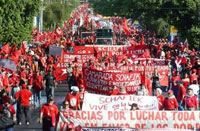‘Schafik Handal, presente!’
Tears & cheers for Salvadoran revolutionary
By
Heather Cottin
Hempstead, N.Y.
Published Feb 5, 2006 8:03 PM
While half a million
people mourned former rebel leader Schafik Handal in the streets of San Salvador
on Jan. 30, Salvadorans in the U.S. and Canada celebrated the life of this
leader of the Farabundo Marti National Liberation Front (FMLN). In Los Angeles,
San Fran cisco, Chicago, Long Island and Toronto, Canada, supporters of El
Salvador’s liberation struggle organized films, people’s masses and
meetings to commemorate Handal’s life.
|
Hundreds of thousands attend funeral
for guerrilla fighter in El Salvador.
|
At an FMLN office in a
basement called “the bunker” here in Hempstead, L.I., Salvadorans
from Long Island and New Jersey gathered to honor their comrade, who died of a
heart attack at the age of 75.
U.S.-sponsored repressive military
governments ruled El Salvador from 1931 through the 1990s. The election of a
communist government in 1931 prompted the U.S. to install strongman Gen. Maxi
mili ano Hernandez Martinez to establish martial law. Hernandez Martinez is
infamous for saying: “It is a greater crime to kill an ant than a
man.”
With U.S. warships stationed offshore in 1932,
Martinez’ armed forces and U.S. advisers conducted “La
Matanza,” the Massacre. They killed over 40,000 people, mostly Indigenous
peasants who supported the people’s government. Fari bundo Marti, a
leading revolutionary, was killed in this bloodbath.
U.S. imperialists
conspired for years with El Salvador’s 14 ruling class families who owned
over 80 percent of the arable land. They protected the regime from labor unions,
land reform or any programs that could help the people.
There were years
of fraudulent elections, poverty and repression. In the 1970s, revolutionary
struggles in South east Asia, Africa, Latin America, the Caribbean and the
Middle East inspired Salvadorans to take up the gun. Workers, peasants,
intellectuals and liberation theologians picked up the banner of Fara bundo
Marti and formed the FMLN. From the late 1970s to the 1990s, they waged an armed
struggle for justice and economic democracy, for land, for dignity, for
humanity.
Handal was the leader of the Salva doran Communist Party and its
representative on the directorate of the FMLN. The guerrillas of the FMLN waged
a mighty war against the Salvadoran military and its U.S. advisers. The
Salvadoran army, trained at the notorious School of the Americas, was brutal and
relentless—getting arms from both the U.S. and Israel.
Years of
massacres by the army and death squads took their toll: the murder of peasants,
priests—including Archbishop Oscar Romero—workers and intellectuals.
Some 75,000 were killed in a war promoted by three U.S. presidents: Jimmy
Carter, Ronald Reagan and George H.W. Bush. When the Soviet Union fell,
liberation struggles all over the world suffered. So too in El Salvador.
The FMLN decided to lay down its arms, and Schafik Handal signed a peace
accord with the U.S.-backed regime in 1992. It became a legal party in El
Salvador, but when Handal ran for president in 2003, intimidation by former
death squads and the U.S. government produced a victory for the right-wing ARENA
party.
To escape civil war, landlessness, unemployment and the death
squads, Salvadorans have been coming to the U.S. since the 1970s. FMLN members
organize widely among day laborers. Its members provide legal, social and
political leadership among support networks in solidarity with Central America
throughout the U.S. and Canada, wherever Salvadorans live.
On Long Island,
the Salvadoran diaspora remains true to its revolutionary origins. On Jan. 29,
in Hempstead, pastor Jaime Barrios led a “misa popular,” a
people’s mass, in celebration of the life of Handal. Barrios and the FMLN
activists who spoke emphasized the continuation of his work, of their struggle
for equality, unity and liberation.
Barrios repeated the words of Cuban
Pre sident Fidel Castro: “Schafik was a great leader of workers, a great
revolutionary leader and an extraordinary human being ... a man who lived with
dignity, faithful to his principles, and who never gave in.”
It was
those principles that moved the people sitting in the “bunker.” Each
person who stood up to give testimony vowed to uphold Schafik’s
principles. Mario Ave lar said that Schafik served as an inspiration to continue
the struggle for the revolution in El Salvador, a struggle that will pro duce a
better society. He said that the huge crowds in the streets of El Salvador
showed that the people realize that Schafik was a man who believed in justice
and dignity.
Barrios referred to the revolutionary movements underway in
Cuba, Bolivarian Venezuela and Bolivia. While poverty in El Salvador is growing,
a new Latin America is emerging, fighting imperialism and its privatization
schemes. Change is coming. This struggle for change was the focus of the life of
Schafik Handal and the objective of FMLN members everywhere.
FMLN member
Carlos Canales read his tribute to Schafik in the Hempstead bunker:
“While there is a single worker living with injustice or pain,
Schafik is not dead.
“While hunger and death still travel in the
Third World, killing a thousand people an hour, Schafik is not
dead.
“It is a lie that Schafik is dead, it is a
lie.
“Let us celebrate his life. Hasta la victoria siempre!”
Articles copyright 1995-2012 Workers World.
Verbatim copying and distribution of this entire article is permitted in any medium without royalty provided this notice is preserved.
Workers World, 55 W. 17 St., NY, NY 10011
Email:
[email protected]
Subscribe
[email protected]
Support independent news
DONATE


